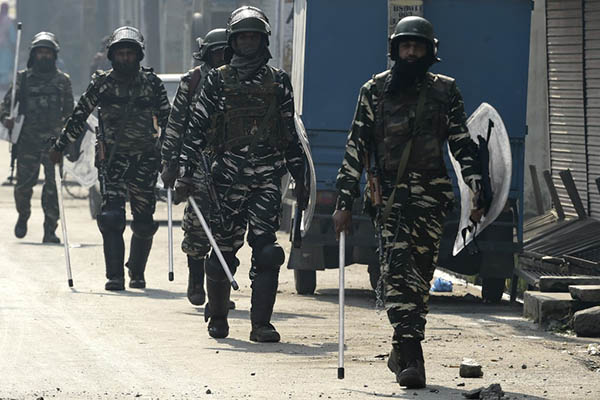
File photo of Indian paramilitary troopers patrolling along a street during a lockdown in Srinagar. Tauseef Mustafa—AFP
In press conference, human rights minister Mazari seeks ‘sanctions’ on Delhi for its alleged atrocities in India-held Jammu and Kashmir
Pakistan on Sunday released a second dossier that it said highlighted Delhi’s atrocities in India-held Kashmir, with three members of the federal cabinet saying it comprised incriminating audio and video, as well as documented evidence of the gross human rights violations, war crimes, genocide and torture perpetrated against Kashmiris.
Urging the international community to stop showing “callousness and apathy toward Kashmiris,” Foreign Minister Shah Mahmood Qureshi said the world must force India to comply with international and moral obligations to allow Kashmiris the right to self-determination in line with relevant UNSC resolutions.
Flanked by National Security Adviser Moeed Yusuf and Human Rights Minister Shireen Mazari, he said the 131-page dossier comprised three chapters and included 113 references, 26 of which were reports compiled by international media; 41 reports prepared by Indian media and think-tanks; 32 citations from international human rights organizations; 14 documents from Pakistan.
Addressing the contents of the dossier, Qureshi reiterated his description of India-held Kashmir as an “open air prison,” adding that 900,000 Indian troops were stationed in the valley. He said the contents of the dossier provided “solid evidence” of “fake encounters” and Delhi’s practice of framing Kashmiri freedom fighters as terrorists. India, he alleged, plants weapons in the homes of innocent Kashmiris and accuses them of being terrorists. According to the dossier, at least 13,000 Kashmiri children have been detained by India. It also alleges that Indian police in December 2020 shot dead three young men and declared them terrorists to justify its extrajudicial killings.
Qureshi alleged that, since 2014, India had conducted 15,495 siege-and-search operations in the restive region. He also noted that India has six draconian laws—Jammu and Kashmir Public Safety Act; Terrorist and Disruptive Activities (Prevention) Act; Armed Forces (Jammu and Kashmir) Special Powers Act; Jammu and Kashmir Disturbed Areas Act; Prevention of Terrorism Act; and the Unlawful Activities (Prevention) Amendment Act, 2019—which allow the state to declare any Kashmiri a terrorist. The foreign minister alleged that India was “training” five Daesh camps—a seeming tit-for-tat for India accusing Pakistan of training terrorists to infiltrate into Kashmir—stressing that the dossier contained the GPS coordinates for all of them.
Referring to the recent death and funeral of Kashmiri leader Syed Ali Geelani, the foreign minister lamented that even his own family members had been prevented from attending Geelani’s funeral. He slammed India for forcibly burying Geelani in a location against his last wishes.
Qureshi also lashed out at India’s refusal to allow independent observers entry into occupied Kashmir, saying it sought to distort the reality faced by Kashmiris. He said it was unfortunate that India had attempted to alter the demographic makeup of Kashmir and urged for a reversal of the unilateral abrogation of the disputed region’s special constitutional status.
Criticizing silence
Human Rights Minister Shireen Mazai, meanwhile, questioned why the U.N. had yet to impose any sanctions on India for its “blatant disregard” for human rights violations in Jammu and Kashmir. She emphasized that the international community should be demanded “special access” to the disputed region to ensure it got an accurate reflection of ground realities.
Referring to reports of mass rapes in Kunan and Poshpora in February 1991, she lamented that perpetrators had yet to be brought to book for such crimes. She said UNSC Resolution 1325 specifically protected women and children in armed conflicts and mandated sanctions on countries that violate the resolution.
Criticizing the U.N. and Western nations for their “silence” on India’s attempted annexation of held Kashmir, she said the E.U. and the international community could not “cherry-pick” sanctions. She also referred to the use of pellet guns by Indian soldiers, adding this was a massive violation of human rights.
To a question, she said the International Court of Justice and other international fora could be approached over India’s “illegal” steps in Jammu and Kashmir. She also compared the policies of Narendra Modi’s government to that of Germany’s Nazis, and questioned how the international community could allow India to hold the office of the president of the UNSC.
Next steps
Qureshi emphasized that protecting fundamental human rights was not just the responsibility of a single nation, but was an international obligation. He said Pakistan wanted India to take the following steps as a result of the dossier:
- Stop human rights violations of Kashmiris
- Proceed against perpetrators who have been highlighted in the dossier
- End any further attempts to alter the demographic makeup of the disputed region
- End the military and digital siege of Indian Illegally Occupied Jammu and Kashmir
- Release all political prisoners
- Allow unhindered access to the region for the U.N., independent Permanent Human Rights Commission of the Organization of Islamic Countries, independent journalists, human rights organizations, and civil society organizations
